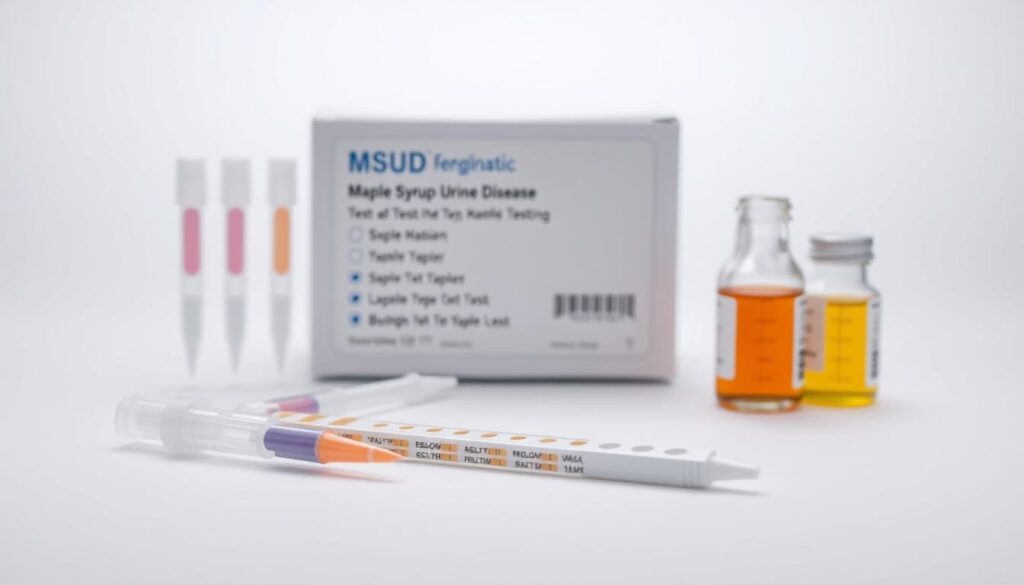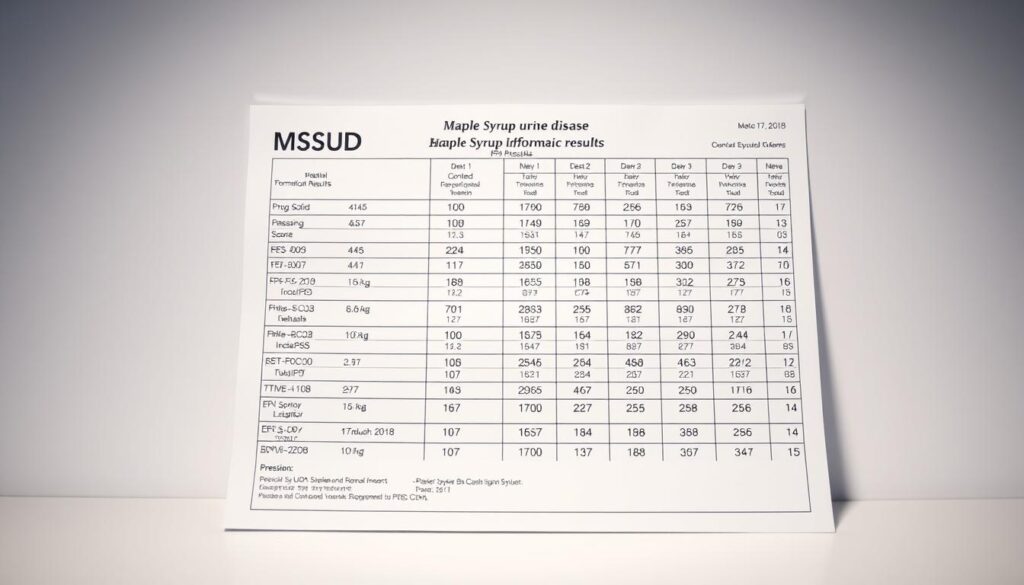Learning about the Maple Syrup Disease Test (MSUD screening) can change a family’s life. It helps doctors find a rare genetic disorder that affects how kids process proteins. This test is key for early detection and treatment.
The Maple Syrup Disease Test is vital for understanding a genetic condition that can affect a child’s health. Pediatric experts see it as a way to catch problems early. This helps families know their genetic risks and get the right medical care.
Genetic disorders need specific tests, and MSUD screening is one of them. It’s a detailed way to find metabolic problems. Newborn screening programs in the U.S. use these tests to spot health risks early.
Knowing about the Maple Syrup Disease Test is important for parents and doctors. It involves a deep genetic analysis. This test can show a lot about a child’s metabolic health, inherited conditions, and treatment plans.
Early detection with MSUD screening can make a big difference in a child’s health. Doctors have developed new tests and treatments. These help kids get the care they need from a young age.
This guide will dive into the world of Maple Syrup Disease testing. It’s for families, doctors, and anyone wanting to learn about this complex genetic condition.
Understanding Maple Syrup Urine Disease (MSUD)
Maple Syrup Urine Disease (MSUD) is a rare genetic disorder. It affects how the body processes certain amino acids. Getting a proper diagnosis is key to managing its symptoms.
Key Characteristics of MSUD
The disease is named for its unique symptom: urine that smells like maple syrup. It impacts protein metabolism due to a genetic mutation.
- Caused by defective enzyme in branched-chain amino acid metabolism
- Inherited as an autosomal recessive genetic condition
- Affects protein breakdown in the human body
Common Symptoms and Signs
Spotting early signs is vital for diagnosing MSUD. Newborns may show several important symptoms:
- Sweet-smelling urine or earwax
- Poor feeding patterns
- Lethargy and weakness
- Rapid breathing
- Potential neurological complications
“Early detection can significantly improve management and quality of life for individuals with MSUD” – Metabolic Disease Specialists
Impact on Daily Life
Managing MSUD requires constant medical care. Patients must stick to strict diets and regular metabolic checks. This helps avoid neurological problems.
Families dealing with this need strong support and expert medical advice. This ensures the best health outcomes.
The Importance of Early Detection and Testing
MSUD screening is key in finding and managing Maple Syrup Urine Disease early. This can stop serious problems before they start. Early tests can greatly help the long-term health of those affected.
The Maple Syrup Disease Test has many benefits when done early:
- Prevents irreversible neurological damage
- Allows immediate dietary interventions
- Reduces risk of metabolic crisis
- Enables proactive medical management
Newborn screening has changed how we find MSUD early. It lets doctors start treatment right away. This helps avoid big risks for development.
| Detection Stage | Potential Outcomes |
|---|---|
| Before 2 Weeks | Optimal intervention possible |
| 2-6 Months | Limited intervention effectiveness |
| After 6 Months | High risk of permanent damage |
Timely diagnosis can turn a severe genetic condition into a manageable health issue. Parents and doctors must see how vital newborn screening is for rare metabolic disorders like MSUD.
Early detection is not just a medical procedure—it’s a lifeline for children with metabolic conditions.
Types of Maple Syrup Disease Test Methods
Identifying Maple Syrup Urine Disease (MSUD) needs advanced tests. These help doctors spot this rare genetic disorder early. The tests are designed to give accurate and detailed results.
Newborn Screening Tests
Newborn screening is the first step in finding MSUD. These tests include:
- Collecting a small blood sample from the infant’s heel
- Analyzing metabolic markers
- Measuring branched-chain amino acid levels
Genetic Testing Procedures
Genetic testing helps understand MSUD better. This includes:
- DNA analysis of specific gene mutations
- Examining familial genetic patterns
- Identifying carrier status
Blood Analysis Methods
Blood analysis is key to confirming MSUD. It measures:
- Leucine levels
- Isoleucine concentration
- Valine amino acid quantities
Each test gives important information. This helps doctors create specific treatment plans for MSUD patients.
When Should MSUD Testing Be Performed?

Newborn screening for MSUD is key for catching this rare genetic disorder early. Doctors suggest testing within the first few days of life. This helps spot metabolic issues fast.
The timing of MSUD tests depends on a few important things:
- Family genetic history
- Presence of possible symptoms
- Ethnic background with higher genetic risk
- Recommended pediatric screening protocols
Genetic patterns can make some families more likely to have MSUD. Recommended testing windows include:
- Immediate newborn screening (48-72 hours after birth)
- Follow-up genetic testing for high-risk families
- Additional screenings during early childhood development
- Testing for symptomatic individuals of any age
Healthcare providers start newborn screening for MSUD with blood tests. This first test looks for metabolic problems that might show MSUD.
Early detection is the best way to manage MSUD and avoid developmental issues.
Families with a genetic risk should talk to genetic counselors. They can help figure out the best MSUD test plan for them.
Preparing for Your MSUD Diagnostic Test
Getting ready for an MSUD diagnostic test can feel overwhelming. Knowing what to do can help reduce anxiety and ensure accurate test results. This guide will help you understand what you need for your Maple Syrup Disease Test.
Proper preparation is key for a successful MSUD diagnostic test. Patients and families should plan carefully and understand the process well.
Required Documentation
Before your MSUD diagnostic test, collect these important documents:
- Comprehensive medical history
- Family genetic history
- Insurance information
- Previous laboratory test results
- Physician referral documents
Dietary Restrictions
Certain dietary guidelines are important for accurate MSUD diagnostic testing. Your healthcare provider will likely suggest:
- Fasting for a specific period before blood tests
- Avoiding specific foods that might interfere with test results
- Maintaining hydration
- Potential temporary dietary modifications
What to Expect During Testing
The Maple Syrup Disease Test usually involves blood work and genetic screening. Patients can expect:
- Quick blood draw procedure
- Minimal discomfort
- Short testing duration
- Professional medical guidance throughout the process
Preparation and knowledge are your best tools when facing an MSUD diagnostic test.
By following these guidelines, patients can ensure a smooth and accurate MSUD diagnostic experience. Always consult with healthcare professionals for personalized advice specific to individual circumstances.
Understanding MSUD Test Results

Understanding Maple Syrup Urine Disease (MSUD) test results needs careful analysis and expert advice. The MSUD test gives important insights into a person’s metabolic health. It helps doctors diagnose this rare genetic disorder.
When looking at MSUD test results, patients and families see three main categories:
- Negative Results: Show no metabolic issues related to MSUD
- Positive Results: Hint at possible Maple Syrup Urine Disease
- Inconclusive Results: Need more tests to figure things out
Positive MSUD diagnosis means high levels of certain amino acids in blood or urine. These high levels show problems with protein breakdown, typical of MSUD.
Doctors suggest getting genetic counseling after any MSUD test. This helps patients understand what it means and get the right medical advice.
Getting MSUD test results right needs special medical knowledge and detailed metabolic checks.
Things that affect how test results are seen include:
- The patient’s age
- Specific metabolic markers
- Family genetic history
- Other clinical symptoms
Those with a positive MSUD diagnosis should team up with metabolic experts. They help create a plan for managing the condition. Early detection through accurate testing is key for good treatment.
Genetic Testing for MSUD: A Complete Guide
Genetic testing for MSUD gives important insights into this metabolic disorder. It helps families understand their genetic risk. This knowledge aids in making better healthcare choices.
MSUD genetic testing looks at an individual’s DNA for specific mutations. This detailed analysis helps doctors diagnose and manage the condition better.
DNA Analysis Process
The DNA analysis for MSUD includes several steps:
- Blood sample collection from the patient
- Extraction of genetic material
- Targeted genetic sequencing
- Identification of specific gene mutations
- Comprehensive genetic report generation
Family History Considerations
Family history is key in MSUD genetic testing. Important factors include:
- Ancestral genetic background
- Previous family diagnoses
- Potential carrier status of parents
- Inheritance pattern assessment
Genetic counselors help families understand test results. They explain what these results mean for future generations. This knowledge leads to better medical care and personalized plans.
Cost and Insurance Coverage for MSUD Testing

Understanding the cost of MSUD screening is key for families. The price varies based on the test type and the healthcare provider. Costs can range from $100 to $1,500 for full genetic testing.
Insurance coverage for MSUD screening also varies. Many health insurance plans cover newborn screening as part of standard care. Private insurers and state Medicaid programs often cover MSUD diagnostic tests, mainly for high-risk families.
- Newborn screening: Often covered by insurance
- Genetic testing: Partial or full coverage depending on plan
- Diagnostic blood analysis: Variable insurance support
Families should take steps to understand their insurance benefits for MSUD screening. Here are some key recommendations:
- Contact insurance provider directly
- Request pre-authorization for testing
- Verify in-network diagnostic centers
- Explore financial assistance programs
Some organizations offer financial help for families needing MSUD diagnostic tests. The National Organization for Rare Disorders (NORD) provides grants and resources for genetic testing costs. State-level programs may also offer financial assistance.
Patients should always consult healthcare providers and insurance representatives to get the most accurate cost information for their specific MSUD screening needs.
MSUD Screening in Newborns: Process and Timeline
Newborn screening for MSUD is key to catching this rare genetic disorder early. It involves a detailed process to catch it fast and start treatment early.
Parents will find the screening easy and helpful. It checks how their baby’s metabolism is working. The test usually happens in the first 24-48 hours after birth.
Sample Collection Methods
Getting a sample for MSUD screening is easy and doesn’t hurt much. Doctors use:
- Heel prick blood sample collection
- Small blood droplet transfer to specialized screening card
- Careful handling to ensure accurate testing
Result Interpretation
Understanding MSUD screening results needs special skills. The process includes:
- Initial blood sample analysis
- Measurement of specific amino acid levels
- Genetic marker identification
- Comprehensive metabolic assessment
Doctors look closely at the results to see if more tests are needed. Early detection through newborn screening for MSUD can significantly improve long-term health outcomes.
Timely screening and interpretation are key for managing metabolic disorders in newborns.
Parents should talk to their doctor about the results. This helps understand what it means for their child’s health and what to do next.
Treatment Options Following Positive Test Results
After a Maple Syrup Urine Disease diagnosis, patients need special treatment plans. The MSUD test shows the need for quick and focused medical care. This is to manage this complex metabolic disorder well.
Treatment for MSUD includes three main steps:
- Dietary Management
- Medical Interventions
- Long-term Monitoring
Dietary management is key in treating MSUD. Patients must stick to a low-protein diet to avoid certain amino acids. Special formulas help keep nutrition balanced and prevent metabolic problems.
When metabolic crises happen, quick medical help is needed. This might include:
- Intravenous glucose administration
- Electrolyte replacement
- Protein restriction
- Dialysis in severe cases
The aim of treatment is to stop neurological damage and control amino acid levels. Regular metabolic tests and working with metabolic healthcare experts are vital. This ensures the best care for Maple Syrup Urine Disease.
Genetic counseling helps families understand the disease’s inheritance and risks. It offers support beyond just medical treatment.
Living with MSUD: Post-Diagnosis Care
Getting a Maple Syrup Urine Disease diagnosis means you need long-term care. Families and patients must plan a healthcare strategy that meets their metabolic needs. It’s important to understand the details of MSUD lab results for ongoing care.
Managing MSUD well involves several key steps. These steps help keep patients healthy and improve their quality of life.
Dietary Management Strategies
Nutrition is key in treating MSUD. Special diets are needed to avoid metabolic problems:
- Limiting branched-chain amino acids
- Using custom medical nutritional formulas
- Working with metabolic dietitians
- Keeping track of calorie intake
Ongoing Monitoring Requirements
Regular medical checks are vital for MSUD management. Doctors suggest regular tests:
- Regular blood chemistry tests
- Checking metabolic acid levels
- Assessing neurological function
- Genetic counseling sessions
Regular medical checks help catch metabolic issues early. This keeps patients healthy for life.
Managing MSUD is a team effort between patients, families, and doctors.
Preventing MSUD-Related Complications
Managing Maple Syrup Urine Disease (MSUD) needs a proactive approach to avoid health problems. Families dealing with MSUD screening and diagnosis must create detailed plans to keep their loved ones safe.
Preventing MSUD-related complications involves several important steps:
- Maintain strict dietary management
- Schedule regular medical monitoring
- Implement emergency care protocols
- Track metabolic balance consistently
Dietary control is key in managing MSUD. Patients need to stick to a special diet that limits certain amino acids. Precision in diet is not just recommended—it’s essential.
Healthcare experts suggest making a personalized prevention plan through MSUD screening and ongoing genetic diagnosis. Important prevention steps include:
- Creating a detailed metabolic crisis prevention plan
- Setting up quick response protocols for illness
- Keeping up with regular medical check-ups
- Using advanced genetic testing insights
Early action is the strongest way to prevent serious MSUD-related health risks. Families must team up with metabolic specialists to create tailored prevention plans. These plans should meet each person’s unique genetic and nutritional needs.
Support Resources and Professional Help
Living with Maple Syrup Urine Disease (MSUD) can be tough. Families need strong support to handle this complex condition. There are many resources to help understand MSUD screening and care plans.
Key support resources include:
- National MSUD Support Groups
- Online Patient Communities
- Genetic Counseling Services
- Specialized Medical Consultation Networks
Getting professional help is key for MSUD management. Qualified genetic counselors offer tailored advice on Maple Syrup Disease Test and treatments. They help families grasp genetic patterns and plan for health.
“Knowledge and support are powerful tools in managing rare genetic conditions.” – Genetic Health Professionals Association
Working with experts in metabolic disorders is vital. Groups like the Maple Syrup Urine Disease Family Support Group provide education, emotional support, and practical advice.
- Comprehensive medical guidance
- Family support networks
- Educational workshops
- Financial assistance programs
It’s important for patients and families to find these support networks. Early action, ongoing learning, and professional connections are key to managing MSUD well.
Conclusion
The Maple Syrup Disease Test is a big step forward in diagnosing and managing Maple Syrup Urine Disease (MSUD). Now, we can catch it early, thanks to new screening methods. This gives families the tools they need to handle this complex genetic condition.
Medical experts have come up with detailed plans to manage MSUD. This turns a potentially scary diagnosis into a manageable health issue.
MSUD screening helps people understand their genetic health risks. New genetic tests and blood analysis have changed how we see inherited metabolic disorders. Patients can now get treatment plans that focus on diet, monitoring, and proactive care.
Living with MSUD means constant effort and support from doctors. The medical field keeps improving treatments and research. This gives hope and practical help to families dealing with this condition.
By catching it early and getting the right care, people with MSUD can live full lives. Medical guidance and support are key to this.
Knowledge is the most powerful tool in managing MSUD. More research, better tests, and teaching patients will improve life for those with this disorder.



